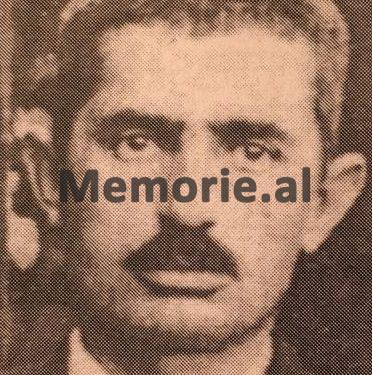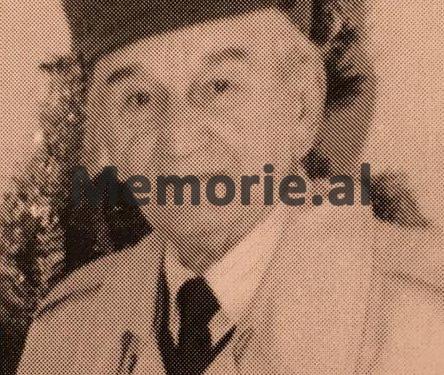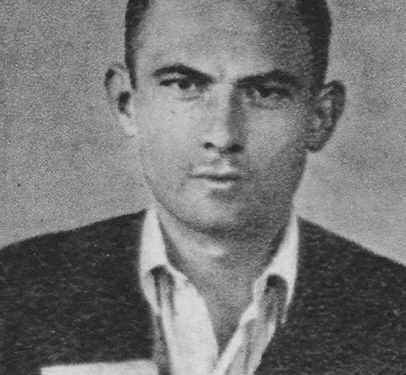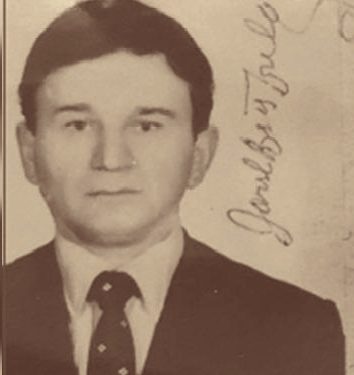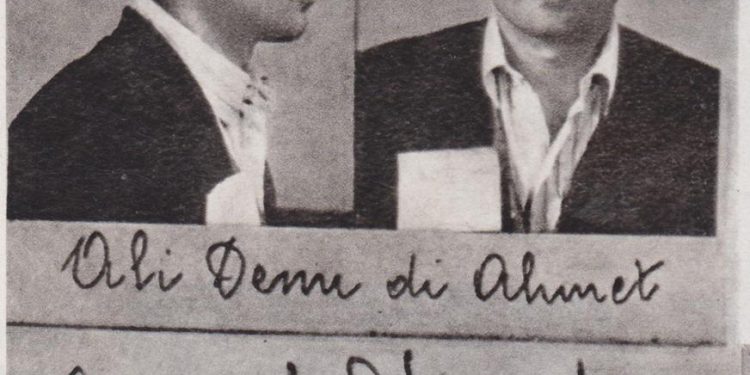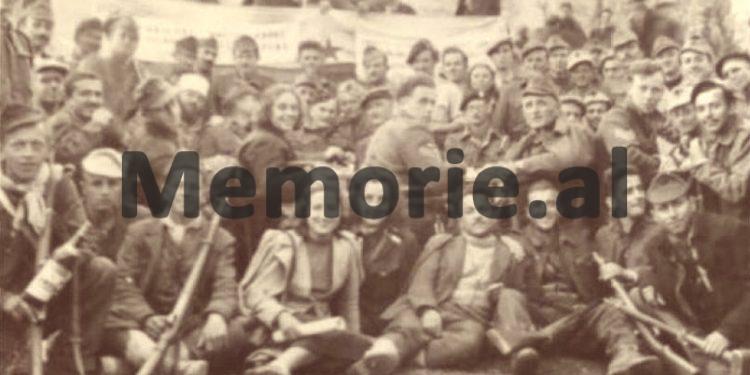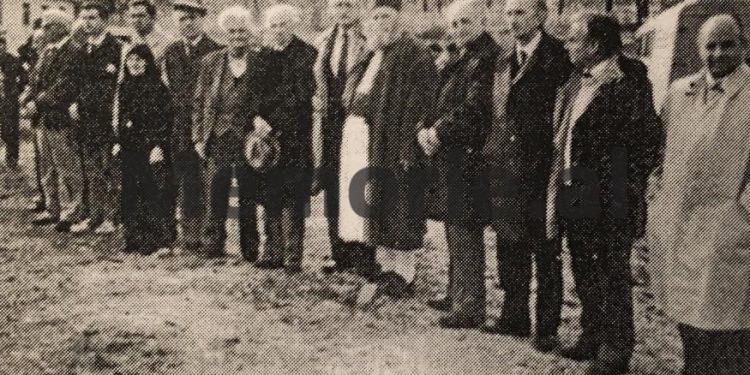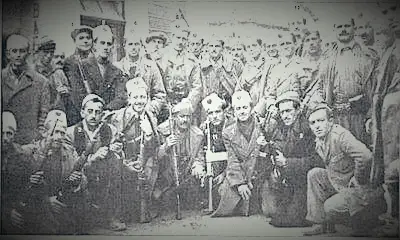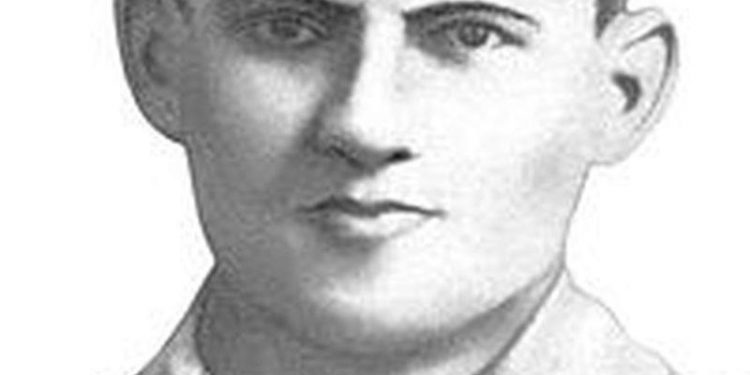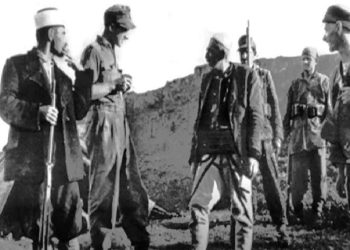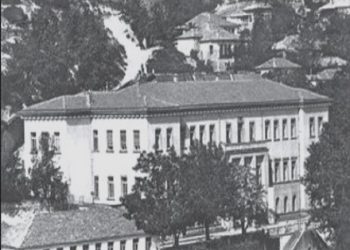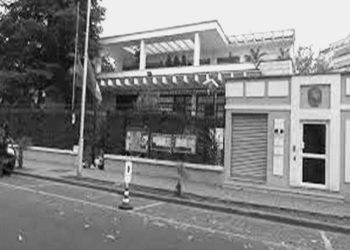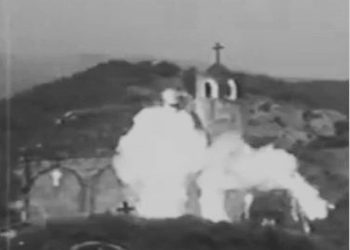Dashnor Kaloçi
Memorie.al/ publishes the unknown story of the Roshi family from the village of Golem in Gjirokastra, where some of its most prominent men, after fighting against the Ottoman forces and the Greek Andart gangs, in 1912, lined up with Ismail Qemali, serving as officers of the newly formed National Army. Rare testimony of Avdyl Hakan Banushi, related to the nationalist Roshi family, who during the occupation of the country, lined up with the nationalist forces of Balli Kombëtar, fighting against partisan forces, after the fratricidal war that had begun after the break-up of the Mukje Agreement. The story of the clash of the partisan forces commanded by Ali Demi in the village of Kaninë in Vlora in December 1943, with the ballistic forces commanded by Professor Tare Kalo, where Ali Demi was also killed. An event which brought the persecution of the Roshi tribe by the communist regime of Enver Hoxha, starting with Alem Reiz Roshi, who was sentenced to be shot in the first days of the end of the War in 1943, Osman Roshi, who was shot in 1950, as well as other members of this family, such as Mehmet Reiz Roshi, who were forced to flee Albania, or Bajram Roshi, who spent 23 years in the dark cells of the prisons of the communist dictatorship of Enver Hoxha, etc.
“The tragic story for the Roshi family would continue for a long time, its beginning began in December 1943, when in the village of Kaninë in an effort with the communist forces, led by Ali Demi, Refik Osman Roshi was killed. Before the grief in this family was well extinguished, in November 1944, in the city of Shkodra, another son of this family was arrested, named Alem Reiz Roshi. The trial against them took place in the Military Court of the Gjirokastra District, where he was sentenced to death along with two nationalists, Zenel Gjoleka and Selam Karma. From that time on, the Roshi family from Golem, Gjirokastra, would suffer savage and barbaric persecution by the communist regime of Enver Hoxha. “This persecution would only end in 1991.” This is how he remembered the story of this family, Abdyl Hakan Banushi, originally from the village of Golem in Gjirokastra, a former member of the nationalist forces of the Youth of the National Front during the war, who spent his entire life in the prisons of the communist regime Enver Hoxha until 1990.
What was the past of the famous Roshi tribe and who were some of its most prominent representatives who made a big name in the Albanian wars and uprisings in the first years of the last century, as well as during the period of Nazi-fascist occupation! What was the political stance held by the members of that tribe and their role during the Anti-Fascist National Liberation War? Why did they get involved with the nationalist organization of “Balli Kombëtar” and what were the circumstances of the murder of Refik Osman Roshi?! Why the ballistic forces confronted at gunpoint with the partisan forces commanded by Ali Demi. Who were the most famous men of that tribe and why were they persecuted by the communist regime of Enver Hoxha?!
Roshaj in the Declaration of Independence
The origin of the Roshi tribe is from Golem of Gjirokastra, which is located northeast of the stone city. He is known for his history since ancient times. It is thought that the first members of that family settled in the village before the period of Skanderbeg, but accurate data about their arrival in the village are very few. Although this family was very famous, during the period of Ottoman occupation, one of the most famous of that tribe was Osman Roshi. Regarding this, Abdyl Banushi told: “The deeds and stories of that famous man named Osman Roshi, are still remembered today from conversations with various residents of our village. Many are proud of his past. Like the leaders of the tribe and his family, who had fought against the Turkish occupiers, Osman Roshi, in the years 1911 – 1912 took an active part in the uprisings that led to the Declaration of Independence of Albania. Along with Osman, some of his relatives took part in those wars, who, like him, not only honored the name of that family, but also the history of our village known for its patriotic traditions. Only a few days after the great event of November 28, 1912, Ismail Qemali, in his capacity of Chairman of the Provisional Government, decreed Osman Roshi as an officer of the Albanian Army, created on December 4. After that he was appointed as an officer in a military regiment that was assigned to protect the southeastern borders of the country from the threats of Greek troops. During that period, Osmani calmly and prudently led that regiment, which withstood the attacks and artificial incidents created by the Greek andart regiments. Osmani served in the forces of the Albanian National Army even after the fall of the government of Ismail Qemali. “After Prince Wid left Albania, Osman Roshi left the army and returned to his homeland,” recalled Abdyl Banushi, referring to the past of the Roshi tribe and the history of Osman.
That family is also known for the support it gave to the new government from the Congress of Lushnja in 1920 and for participating as volunteers in the Vlora War. During that war, against the forces of the Italian army led by the most prominent men of Vlora, such as Osman Haxhiu, Qazim Kokoshi, Qazim Koculi, etc. in addition to Uthman, his two brothers, Mustafa and Reizi, also fought. This contribution was also recognized during the reign of King Zog.
Incidents in Libihova and Glina
During the years of King Zog’s Monarchy, members of the Roshi tribe did not meddle in politics but looked after their own affairs. Unlike that period, during the Italian and German occupation of the country, almost the entire tribe sided with the National Front, led by Mit’hat Frashëri. Regarding this, Abdyli Banushi, among other things, said: “The tragic story of the Roshi family dates back to the autumn of 1943, when the Albanian Communist Party unilaterally terminated the Mukje Agreement. The breach of that agreement immediately bore bitter fruit in all the provinces of the country, beginning the brother-killing! This happened in our district of Gjirokastra, where seven days after the meeting, in September 1943, partisan forces entered the Municipality of Libohova and killed many nationalists and members of the National Front who were there. This great massacre caused a deep indignation among the inhabitants and for this reason, the ballistic forces commanded by Qazim Rustemi, took on the task of surrounding the partisan forces that were positioned in Glina, near Gjirokastra. After this siege, he attacked them completely annihilating them. But after this act, even though he knew that the communist troops had started the fighting first, the Gjirokastra National Front Command condemned this attack by Qazim Rustemi’s forces. “This conflict would also mark the beginning of hostility between communist and nationalist forces, and for this reason the Roshi tribe would suffer greatly.”
The murder of Ali Demi by Refik
After the beginning of the fratricidal war between the communist and nationalist forces, one of the most tragic events happened for the Roshi family of the village of Golem in Gjirokastra. In this regard, Abdyl Banushi said: “In December 1943, a partisan battalion commanded by the communist Ali Demi, known as the professional assassin, entered the village of Kaninë in Vlora, where he set up his headquarters. At that time this area was controlled by the nationalist forces of “Balli Kombëtar” and the commander of the forces of Vlora, Major Enver Risilia, who ordered the communist battalion of Ali Demi, to leave that village immediately. After Ali Demi refused the order, Major Enver Risilia informed the Commander of the Gendarmerie of the Gjirokastra-Vlora area, Ismail Golemi, who ordered the battalion commander, Professor Tare Kalon, to go to the aid of the National Front forces that had left for in Kanina. After this order, Professor Tare Kalo together with Ali Shefqet Mustafaraj, left for the village of Kaninë, where the partisan battalion commanded by Ali Demi was installed. They had received orders that in case of opposition by Ali Demi’s partisan forces, force be used against them. And as predicted, Ali Demi, with the forces he commanded, opposed the order to leave that village, and after that, a fierce battle broke out between the two sides. After several hours of fighting, the partisan battalion began to retreat, but their commander, Ali Demi, along with two partisans who accompanied him, remained surrounded inside the village and hid in a one-story house known as a partisan support… After that, the commander of the National Front battalion and order to search all the houses suspected of being affiliated with the partisans. During that search, the 23-year-old captain of the ballistic forces, Refik Osman Rroshi, also took part, who discovered Ali Demi and his two guards hiding on the roof of a house where they searched. After that, Refik ordered them to surrender, but Ali Demi with two other partisans blew up the roof of the house and tried to get out of the siege. At that moment, Refik came face to face with Ali Demi and fired a machine gun, killing him and his two guards. “After that murder, the partisan forces returned to the village and during the fierce battle that broke out between them, Refik Osman Rroshi was also killed”, says Avdul Banushi, about the incident in the village of Kaninë, where Ali Demi was killed, (” Hero of the People”).
Execution of Alem Rroshi
After the assassination of Refik Rroshi, in the ranks of the nationalist forces of “Balli Kombëtar”, remained one of the other sons of that family, 18-year-old Alem Reiz Rroshi, who at that time served as bodyguard of Zenel Gjoleka, one of the main exponents of “Balli Kombëtar” for the district of Vlora. After taking part in several battles against partisan forces, Alemi was arrested by them in November 1944, in the city of Shkodra. After the arrest, he was brought to the city of Gjirokastra, to be tried by the Military Court of that District, where Zenel Gjoleka, Selam Karma and Rexhep Guga were with him in the dock. In the session where the claim was given, the prosecutor Bexhet Mema, demanded the death sentence, for Zenel, Selam and Rexhepi, while for Alem, only 15 years in prison. After sentencing, the President of the Court told Alem: “Defendant Alem Rroshi, even though you were a loyal guard of Zenel Gjoleka, even though you committed crimes, our Party and comrade Enver spare your life”. After that he asked Alem for the last word, to which he replied: “Gentlemen of the court, I was the bodyguard of this patriot, who is the nephew of the great Zeneli Gjoleka, who was killed in Montenegro, fought for the Albanian lands, which the people still sing about for their bravery. Here, these are Gjoleka, Mr. Chairman. If you will spare the life of my commander Zenel Gjoleka, you will commit a patriotic act for a great patriot. Otherwise, I want and I have the honor to be shot hand in hand with my commander, patriot and brave, because even there in the common pit where you will throw us, there he will guard them “! After that, the trial panel withdrew to give the verdict and after a few minutes, communicated it saying: “Zenel Gjoleka, Selman Karma and Alem Roshi are sentenced to death, by shooting, while Rexhep Gega, to 25 years in prison.”
The shooting of Syrja Roshi
During the years of the communist regime of Enver Hoxha, the Roshi family from the village of Golem in Gjirokastra, was subjected to a savage persecution, which only Mehmet Reiz Roshi, Alem’s brother, could escape, who was forced to flee. Albania. As for the others who remained in Albania, Avdyl Banushi said: “One of the sons of the Roshi family, who never bowed before the violence of the communist regime, was also Syrja Osman Roshi, who in the early 50s, was arrested ostensibly implicated in a group of counterfeiters. After that he was sentenced to death, by firing squad, and his execution took place in the city of Vlora. Syrjai’s execution also marked the third victim from that family, which would continue to be under the brutal violence of the communists. After that, Alem Roshi’s father, Reizi, spent his entire life in exile and died in deep misery in the village of Shtepa in Gjirokastra, together with his young son, Bajrami, who suffered 23 years in the prisons of Enver Hoxha’s regime.”/Memorie.al




